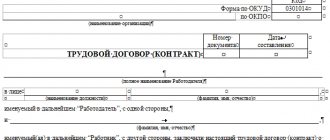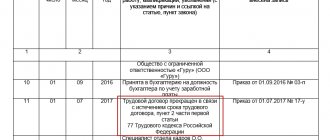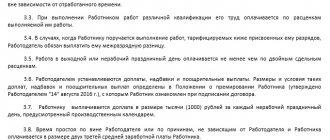An employment contract is the main legal document regulating the relationship between an employee and an employer. The document has legal force; the provisions specified in it must be strictly observed by both parties to the labor relationship. A properly drafted employment agreement will help protect the interests of the employer without infringing on the interests of the hired personnel. The document must be drawn up in writing in two copies.
Many employers are interested in the question: has the standard form of an employment contract been approved in 2021? Or can it still be composed in free form? The answers to these and other questions are in our material.
Waiver of regulations since 2017
Starting from 2021, employers (organizations and individual entrepreneurs) belonging to micro-enterprises have the right to fully or partially refuse to adopt local regulations containing labor law standards. Instead, from 2021, working conditions can be stipulated directly in employment contracts concluded with employees on the basis of a standard form. This is provided for in Article 309.2 of the Labor Code of the Russian Federation, which comes into force on January 1, 2021.
For more information about this, see “Local regulations from 2021: changes to the Labor Code of the Russian Federation.”
Microenterprises include organizations or individual entrepreneurs that meet the following criteria:
| Criterion | Limit value |
| Average number of employees. | For the previous calendar year, the average number of employees of an organization or individual entrepreneur does not exceed 15 people inclusive. |
| Income from the sale of goods (works or services). | Receipts for the last calendar year do not exceed 120 million rubles. The criterion is relevant for organizations and individual entrepreneurs. |
| Composition of founders (relevant for organizations). | Requirements for the shares of participants: - the total share of regions, municipalities, public, religious organizations, foundations cannot exceed 25%; — the total share of participation of third-party organizations (Russian or foreign) is no more than 49%. |
You can check whether, as of January 1, 2021, an organization or individual entrepreneur belongs to a microenterprise through the “Unified Register of Small and Medium-Sized Enterprises,” opened since August 2021 on the Federal Tax Service website at https://rmsp.nalog.ru/. You will need to enter the details of the company or individual entrepreneur and note that you are looking for yourself among micro-enterprises.
If you are on the register, then from 2021 you can switch to concluding employment contracts with employees on the basis of a standard form and refuse to adopt local regulations containing labor law standards.
Also see “Register of Small Entrepreneurs”.
Micro-enterprise criteria, number
The Labor Code has been supplemented with a new chapter 48.1, which establishes the specifics of regulating the labor of persons working for employers - small businesses included in the category of micro-enterprises. In particular, from January 2021, “micro-babies” will have the right to organize simplified personnel document flow.
Individual entrepreneurs and organizations related to micro-enterprises (Article 4 of Law No. 209-FZ) included in the relevant register, the average number of which for the previous calendar year does not exceed 15 people and the total income from all types of business activities for the previous year, determined in the manner established by the legislation of the Russian Federation on taxes and fees, does not exceed 120 million rubles - received the right from 01/01/2017 to simplify their personnel document flow.
You will lose the status of a MICRO enterprise if the amount of income or the average number of employees exceeds the limit values for three calendar years in a row (Part 4 of Article 4 of the Law of July 24, 2007 No. 209-FZ). And even if the upper values are for a Small Enterprise, then the company will be excluded from the register no earlier than July 1 in three years (letter of the Federal Tax Service of Russia dated August 23, 2021 No. SA-4-14/15480).
If a micro-enterprise loses its status, then within four months the employer will have to bring labor relations to the general order.
In particular, the named subjects may not adopt local acts containing labor law norms, such as (Article 309.2 of the Labor Code of the Russian Federation):
- labor regulations of the organization;
- wage regulations;
- bonus regulations;
- shift schedule.
The list is open - the norm also provides for “other documents”. But this “openness” is still conditional, otherwise it is unlikely that some of the relaxations (initially stated in the bill) would have been “lost.” By the way, some of them disappeared after public discussion of the project by the time it was submitted to the State Duma: the first version assumed that the vacation schedule would no longer be mandatory for micro-enterprises (Article 123 of the Labor Code of the Russian Federation), such employers would not have to approve the form of the pay slip (Article 136 of the Labor Code RF).
[rsya6]
Composition of a standard form of an employment contract
The form of a standard employment contract consists of a preamble (that is, an introductory part) and 11 sections:
| Sections of the employment contract | |
| 1 | General provisions. |
| 2 | Rights and obligations of the employee. |
| 3 | Rights and obligations of the employer. |
| 4 | Employee remuneration. |
| 5 | Working time and rest time of the employee. |
| 6 | Occupational Safety and Health. |
| 7 | Social insurance and other guarantees. |
| 8 | Other terms of the employment contract. |
| 9 | Changing the terms of the employment contract. |
| 10 | Responsibility of the parties to the employment contract. |
| 11 | Final provisions. |
The form of a standard contract already includes all the mandatory information and conditions that must be stipulated in the contract according to the rules of Chapters 10 and 11 of the Labor Code of the Russian Federation.
In particular, the standard form contains wording regarding information about salary, position, place of work, working hours, etc. Also, the standard form of the contract includes various wording regarding special working conditions, for example, remote and home workers who are not used in other cases. In other words, the form of a standard contract is, in fact, a universal contract “for all occasions”. In it, employers can find formulations for a variety of situations. And thanks to this, the standard form of an employment contract will help the manager enter into contracts with the requirements of labor legislation and take into account the features associated with the performance of specific work related to a specific employee. This conclusion was made on the website of the Government of the Russian Federation. https://government.ru/docs/24339/
But which local regulations can we refuse to adopt starting from 2021? All employers who wish to switch to standard contracts will certainly face this question. Let's look at this in more detail.
Legislation
All aspects of organizing the workplace, defining functions, remuneration for work, and rest are regulated by the Labor Code. A whole section in this legislative act is devoted to documenting the above points. If you refer to Section III, you can clarify the rules and all the nuances of filling out an employment contract.
The requirements for such an agreement are described in the Labor Code (Article 57) and contain:
- parameters that must be present in the document;
- conditions that are additional in a particular case;
- details of both parties.
What personnel documents can you refuse?
Let us give examples of some personnel documents, which since 2017 can be fully or partially replaced by employment contracts concluded on the basis of a standard form.
Regulations on remuneration and bonuses
The regulation on wages is an internal normative act that defines the size, grounds, procedure and conditions for assigning payments for labor, taking into account state guarantees to employees and the employer’s own financial capabilities. This document often stipulates the conditions for paying bonuses to employees.
See “Terms for payment of bonuses under the new wage law: what has changed.”
However, the “Regulations on remuneration and bonuses” can be completely (or partially) replaced with the wording from section 4 of the standard form “Employee remuneration”. So, for example, in employment contracts concluded on the basis of a standard form, it will be necessary to specify wages (official salary or piece rates) and indicate the exact dates of its payment.
Also see “Salary and advance in 2021: how many days between payments.”
Tables are also provided to describe compensation and incentive payments:
You can also use standard formulations about the procedure for paying wages (through a cash register or through a bank), about the indexation of earnings, etc.
Internal labor regulations
Labor regulations may regulate, in particular, the time of work and rest (Part 4 of Article 189 of the Labor Code of the Russian Federation). However, these rules can be replaced by the language from section 5 of the standard contract form. Here is an excerpt from this section.
Regulations on irregular working hours
This document usually contains a list of workers with irregular working hours, if such a regime is established for them (101 Labor Code of the Russian Federation). A similar local act may not be applied from 2021 if the wording from clause 19 of the standard form is included in the employment contract.
Rules and instructions on labor protection
These documents are developed and approved in accordance with paragraph 23 of part 2 of article 212 of the Labor Code of the Russian Federation. The form of a standard employment contract contains section 6 “Occupational Safety and Health”. It contains language, for example, about the class of working conditions in the workplace, initial training, and the provision of personal protective equipment. In this part, you can switch to a standard contract.
However, rules and instructions on labor protection are usually much more informative. Therefore, most likely, not all employers will be able to completely abandon them.
Job Descriptions
The obligation to draw up job descriptions is established only for government agencies (Article 47 of the Federal Law of July 27, 2004 No. 79-FZ). Therefore, it is impossible to fine an ordinary employer for lack of instructions (letter of Rostrud dated 08/09/2007 No. 3042-6-0). However, many employers draw up job descriptions because their availability allows, for example:
- justify the dismissal of an employee due to inadequacy of the position;
- distribute responsibilities evenly between similar positions;
- prove in court the legality of imposing a disciplinary sanction on an employee;
- conduct personnel certification, etc.
The job description, in itself, is not a local regulatory act. In practice, job descriptions are quite often drawn up simply as an appendix to an employment contract or as an independent document (Rostrud letter No. 4412-6 dated October 31, 2007).
At the same time, the form of a standard employment contract allows that the employee’s labor (job) responsibilities can be established:
- or directly in the employment contract;
- or in the job description.
It turns out that the form of a standard employment contract allows the employer to decide what is more convenient for him to do. Either continue to approve job descriptions separately or specify all the functionality of employees in the employment contract.
Shift schedule
Shift schedules are drawn up based on the established norm of working time for the accounting period for a specific category of workers and contain information about the duration of working time during a shift, rest breaks between shifts and the order of their rotation. All this information, in principle, can be reflected in employment contracts. The necessary formulations for this are in a standard form:
What documents should not be refused?
The commented form of a standard employment contract will not replace some personnel documents. Some documents will still need to be approved and applied. Let's give examples.
Staffing table
The staffing table is used to formalize the structure, staffing and staffing levels (Article 57 of the Labor Code of the Russian Federation). The staffing table is a local regulatory act (paragraph 6 of letter No. PG/4653-6-1 dated May 15, 2014). However, this document does not regulate the labor activities of employees. Therefore, the employer is not obliged to familiarize employees (including when hiring) with the staffing table.
At the same time, by virtue of paragraph 3 of part 2 of Article 57 of the Labor Code of the Russian Federation, the staffing table is a mandatory document. In this regard, an employment contract cannot in any way replace the staffing table. Accordingly, its approval in 2021 should not be abandoned.
Vacation schedule
The vacation schedule is drawn up for each calendar year. It must be prepared two weeks before the onset of this period. That is, for example, the vacation schedule for 2021 must be drawn up no later than December 17, 2021.
See “Make your vacation schedule for 2021 before December 17.”
The purpose of the schedule is to establish the order in which vacations are granted. In this case, the vacation schedule is required to be approved by the employer. This is directly stated in Part 1 of Article 123 of the Labor Code of the Russian Federation. Therefore, the employer does not have the right to refuse to approve and apply this document. Moreover, a reference to the vacation schedule as an independent document is provided for in clause 22 of the standard form of the employment contract. Therefore, it is impossible to refuse to use the vacation schedule.
Other documents
Some other personnel documents cannot be replaced by standard contracts due to the fact that the standard form approved by Decree of the Government of the Russian Federation of August 27, 2016 No. 858 simply does not provide suitable wording. Here are examples of such personnel documents.
| Statement on personal data. |
| Regulations on certification. |
| Regulations on the protection of trade secrets. |
| Regulations on business trips. |
Transition to standard employment contracts
The legislation does not oblige employers to switch to standard employment contracts. Article 309.2 of the Labor Code of the Russian Federation only allows that organizations and individual entrepreneurs have the right to fully or partially refuse to adopt local acts that they are required to approve.
Employers who have already approved local regulations until 2021 and apply them may not change anything in their work. In particular, you can hire new employees and, as before, introduce them to these local acts (and not pay attention to the standard form of the employment contract).
However, another option is possible: starting from 2021, you can hire new employees and conclude employment contracts with them based on a standard form. And then you may not apply (in whole or in part) some local regulations. Existing employees from 2017 can be transferred to standard employment contracts. To do this, additional agreements will need to be concluded with them.
See “Additional agreement to the employment contract: samples.”
tipovaya_forma_trudovogo_dogovora.jpg
Related publications
An employment contract is the main legal document regulating the relationship between an employee and an employer. The document has legal force; the provisions specified in it must be strictly observed by both parties to the labor relationship. A properly drafted employment agreement will help protect the interests of the employer without infringing on the interests of the hired personnel. The document must be drawn up in writing in two copies.
Many employers are interested in the question: has the standard form of an employment contract been approved in 2021? Or can it still be composed in free form? The answers to these and other questions are in our material.
Is it possible to change the wording
The form of a standard agreement, approved by Decree of the Government of the Russian Federation dated August 27, 2016 No. 858, is quite large and, as we have already said, includes various options for filling out individual paragraphs. Is it necessary for an employer to save the entire text of a standard contract? Or is it possible to take from the approved form only the wording necessary for a specific situation?
In our opinion, the form of a standard employment contract has been approved, among other things, so that only the necessary wording can be taken from it. And if the working conditions are not connected in any way, for example, with remote work, then words about remote work may not be included in the employment contract.
Is it possible to correct the approved wording? So, for example, paragraph 17 of the approved contract form states that “Payment of wages to an employee is made _____ once a month (but not less than every half month) on the following days (specify specific days of wage payment).” Is it possible to reformulate this condition in other words? In our opinion, if an employer decides to abandon the approval and application of local regulations and switch to concluding standard employment contracts, then the approved wording should not be changed. After all, it is the use of the approved form of a standard employment contract that gives the right to refuse local regulations. This is stated in Article 309.2 of the Labor Code of the Russian Federation. If you start changing the wording, it is not clear what the “use of the standard form” will be.
However, it is worth noting that there are no official clarifications on the procedure for concluding employment contracts based on the standard form. The Ministry of Labor of Russia has the right to give such explanations (clause 2 of the Decree of the Government of the Russian Federation dated August 27, 2016 No. 858).
Read also
02.06.2017







